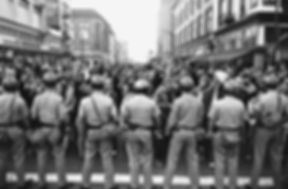
1966 — Photographs of West Oakland taken for Bob Scheer's 9th Congressional District election campaign
The 9th Congressional District
Prior to redistricting by the California Citizens Redistricting Commission of 2011, the 9th district encompassed part of the East Bay region of the San Francisco Bay Area. Cities in the district included Oakland, Berkeley and Castro Valley.
Cohelan, Scheer and Dellums
Bay Area radical writer and correspondent Robert Scheer challenged U.S. Representative Jeffrey Cohelan in the 1966 California Democratic primary. Cohelan was a liberal, but like most Democratic officeholders at that time, he supported the Vietnam War. Scheer campaigned as an anti-Vietnam War candidate, and lost the election by a narrow margin, winning over 45% of the vote (and carrying Berkeley). Scheer's near-victory was a strong enough showing to be an encouraging indication of the potential power of New Left, sixties radicalism. Ron Dellums, then a Berkeley City Councilman, took advantage of the progressive electoral atmosphere to run against and defeat Cohelan in 1970. Dellums represented the 9th Congressional District for thirteen terms until 1998, after which he had a career as a lobbyist. He was the first African American elected to Congress from Northern California and was said to be the first openly socialist Congressional candidate elected since World War II.
Who is Robert Scheer?
In 1962 Scheer, along with David Horowitz, Maurice Zeitlin, Phil Roos, and Sol Stern founded "Root and Branch: A Radical Quarterly," one of the earliest New Left journals.
While working at City Lights Books in San Francisco, Scheer co-authored Cuba, an American Tragedy (1964) with Maurice Zeitlin. Between 1964 and 1969, he served as the Vietnam correspondent, managing editor, and editor-in-chief of "Ramparts" magazine in San Francisco. Scheer reported on Cambodia, China, North Korea, Russia, Latin America and the Middle East (including the Six-Day War), as well as on national security matters in the United States. While in Cuba, where he interviewed Fidel Castro, Scheer obtained Castro's permission to write an introduction for the diary of Che Guevara, published in Ramparts magazine and in book form by Bantam Press. After Ramparts collapsed, Scheer became a freelance writer who was published in major magazines, including Look, Esquire, Lear's and Cosmopolitan. He continues today as a correspondent and radio host.
These photographs
I was asked by the Scheer campaign in 1966 to take photographs showing conditions in west Oakland, part of the Congressional District he was seeking to represent. These are some of the photographs I took. I don't know if or how they were used in the campaign.
Unemployment office, Oakland.
Unemployed men, downtown Oakland. Yes, they're dressed to the nines. Sometimes, looking good means feeling good, even if you're not doing so good.
These guys didn't mind my taking their photos when I explained why.
These guys taught me something about maintaining dignity in the face of adversity.
Little boy on his front steps, West Oakland.
House for rent, West Oakland.
A recent fire. I don't know if these boys lived there before this home was destroyed.
These kids were picking wild blackberries on a vacant West Oakland lot (L, R and below).
Alameda County Welfare Department Office.
Emergency waiting room, Highland (public) Hospital.













